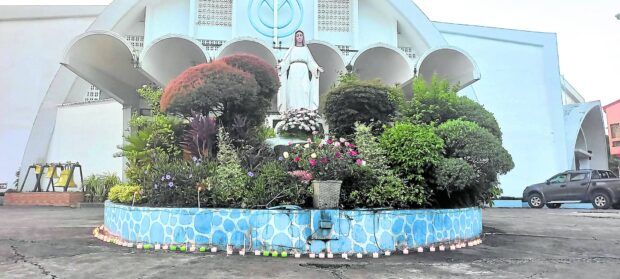
DIOCESAN SEAT | The image of Our Lady Mediatrix of All Graces greets parishioners visiting the cathedral in Kidapawan City. (Photo by WILLIAMOR A. MAGBANUA / Inquirer Mindanao)
KIDAPAWAN CITY, Cotabato, Philippines — The Diocese of Kidapawan in this capital city of Cotabato province and Negros Occidental Rep. Jose Francisco “Kiko” Benitez found themselves in similar situations when they became victims of cyberhackers who hijacked the diocese’s website and the representative’s social media account and replaced contents with lewd materials.
Kidapawan Bishop Jose Colin Bagaforo on Tuesday warned parishioners not to like and to either share or click on the links of what used to be their website as church information technology (IT) technicians were still trying to retake the site from the hackers who took over the diocesan page on Aug. 20.
Thousands of parishioners of the Diocese of Kidapawan were shocked on Sunday when they tried to access the diocese’s page and saw, instead of the live Masses they intended to watch, lewd photos promoting pornographic sites.
As of posting time, the diocese’s IT team still failed to recover the original account, prompting Church officials to warn the faithful and the public not to click the invitations on the page.
Bagaforo also alerted parishioners that their Facebook page might have been compromised.
“If you receive invitations to like the Diocese of Kidapawan page, please delete it, as hackers have invaded our social media account,” Bagaforo said.
He also urged parishioners to report the page to the Facebook support team and to immediately unfollow it.
“Please do not click any link posted through our (FB) page or Messenger and do not share the page with another,” Bagaforo called on parishioners.
Instead, Bagaforo asked that all transactions related to the Diocese of Kidapawan should be done at the chancery office and not on Facebook “to avoid being scammed by the hackers.”
Solicitation scam
Aside from the diocese’s page, hackers also attacked the personal social media accounts of Kidapawan priests, including those of Fr. Vickny Jalico and Fr. Jonel Peroy, which the hackers used in soliciting financial assistance from parishioners.
Bagaforo asked parishioners not to entertain any post or message, especially those making solicitations in the name of the diocese.
Bagaforo’s personal Facebook account was also invaded by hackers last week. The hackers used the bishop’s Messenger account to send messages to the names on his friends’ list, asking for financial assistance.
It was a good thing that business owners and even a personal friend of the bishop who received the request did not immediately believe it and, instead, personally asked the prelate about it.
Bagaforo credited the prompt action and presence of mind of parishioners for the failure of the scammers to get money from the bishop’s contacts.
“I pray that God will touch the heart of the hackers,” the prelate said.
‘Hot movies’
In Negros Occidental, the official Facebook page of Rep. Jose Francisco “Kiko” Benitez of the province’s third district was hacked by still unidentified persons and now features video clips from “hot movies.”
The Facebook accounts of Bacolod City’s MassKara Festival and the “Bilis Cadiz, Ugyon Cadiznon” of Cadiz City were also hacked and similar video clips were posted.
The profile picture of Benitez on his Facebook page, which has 19,000 followers, has been replaced with a photo of a woman who appears to be one of the actresses in the “hot movies.”
An advisory from the office of Benitez on Monday said they were working on regaining control of the page and urged the public to report any suspicious content and to avoid engaging with unauthorized posts.
Facebook has regularly been advising its users to use strong passwords and two-factor authentication to secure their accounts and to watch out for suspicious links and malicious software.
“Keep an eye out for links you don’t recognize, especially if they’re coming from people you don’t know or trust. Be careful not to click on suspicious links, open suspicious files, or install malicious apps or browser extensions—even if they appear to come from a friend or a company you know,” it said
.This includes links on Facebook, private messages, and emails.
“Keep in mind that Facebook will never ask you for your password in an email. You can always confirm whether an email claiming to be from Facebook is authentic by reviewing recent emails we’ve sent in the security and login settings … If you see a post or message that tries to trick you into sharing personal information, please report it,” Facebook said.